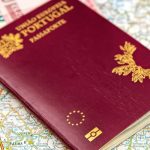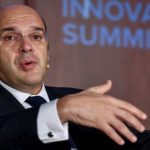Novo Banco – “I don’t regret a thing” says Centeno
Portugal’s former finance minister Mário Centeno says he doesn’t “regret a thing” in the way the Government handled the sale of Novo Banco in 2017 to the US vulture fund Lone Star.
In an interview on TSF radio, the man who will shortly take the reins at the Bank of Portugal and is already assembling his team at the banking sector supervisor, admitted that: “We could have always done something different, but if you are asking me if I now regret anything that was done, the answer is an easy one, No”.
Centeno said: “Today we have a lot more information and with this data perhaps other decisions could have been taken but with the information that existed (at the time) it couldn’t have really been done any differently and we studied all of the alternatives”.
Centeno again defended the use of share blocking* as this was “just one of the ways that there was enough money at the end of the month”.
“I didn’t come up with these measures and nether did the secretary of state — today a minister — invent them,” he stated.
Last week Novo Banco admitted that it would need more taxpayers’ cash in the form of a loan to keep the bank within stipulated capital ratio levels because of the effects of the pandemic and the support it has had to give companies and families to survive the crisis.
“We cannot run the risk of going to Parliament in the middle of the year cap in hand for more money for Novo Banco,” he said.
Novo Banco made clear that the capital needs of the bank would be announced in 2021 as stipulated in a contract and after the end of year financial accounts had been audited and verified by auditors Oliver Wyman.
On Saturday the newspaper Público reported that in 2015 a confidential memorandum from BNP Paribas in collaboration with the Bank of Portugal concluded that at the time Novo Banco accounts were “well provided for” by a “portfolio of credit backed by guarantees.”
According to the same publication, the memorandum expected that the bank would achieve a €180 million profit in 2019.
They money Novo Banco received to recapitalise the bank totalled €2.9Bn since 2017 and on 8 May the Government confirmed that a new capital injection had been made by the Resolution Fund of around €850 million.
This amount was made via the mechanism agreed at the time of the sale of Novo Banco to Lone Star (2017) by which the Resolution Fund would compensate the bank for asset losses resulting from the winding up of Banco Espírito Santo.
However, because the Resolution Fund does not have the necessary funds for the capital injections for Novo Banco, it has annually asked the State for money with the provision that the money would be paid back over 30 years.
This time, from the €1.037Bn that the Resolution Fund injected into Novo Banco, €850 million came directly from the state.
In 2018, of the €1.149Bn transferred from the same fund, €850 million came from the state in the form of a loan.
In 2017 Novo Banco received €2.978Bn from the fund of which €2.1Bn was lent by the state.
In all, Novo Banco has now received €2.978Bn from the Resolution Fund of which €2.130Bn came from the Portuguese State.
In a parliamentary hearing of the Budget and Finance Commission, the new Portuguese Finance Minister João Leão insisted that there is “no sum of money earmarked to capitalise the bank this year” and left a clear message to the bank’s president António Ramalho. “You should concentrate on managing the bank well until the end of the year. That’s down to you”.
*A block trade or share blocking is the sale or purchase of a large number of securities. A block trade involves a significantly large number of equities or bonds being traded at an arranged price between two parties. Block trades are sometimes done outside of the open markets to lessen the impact on the security price. In general, a block trade involves at least 10,000 shares of stock, not including cent stocks, or €200,000 worth of bonds. In practice, block trades are much larger than 10,000 shares.










